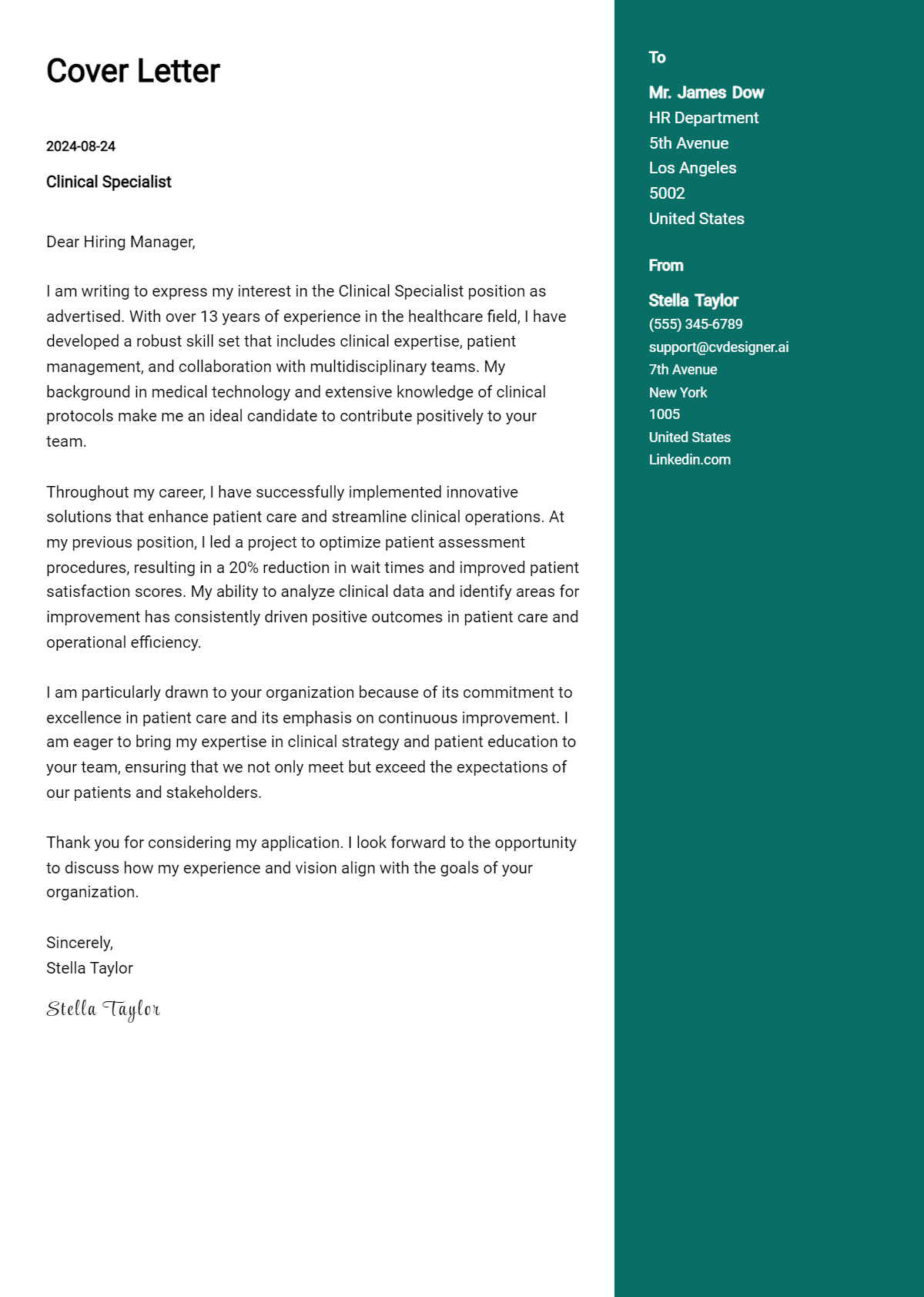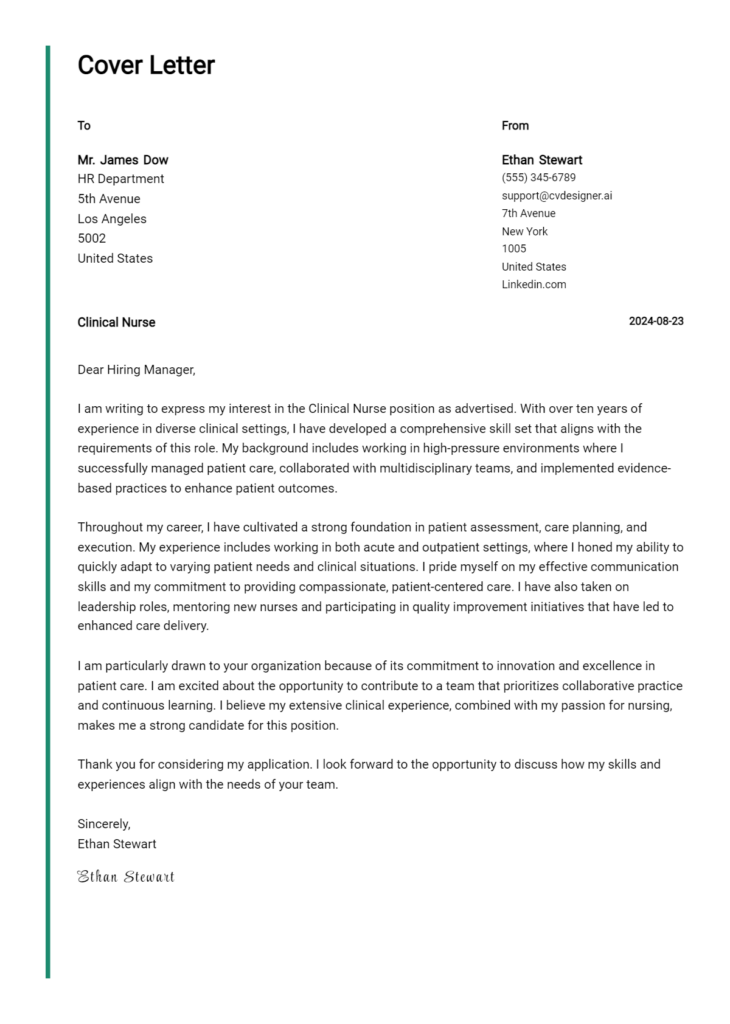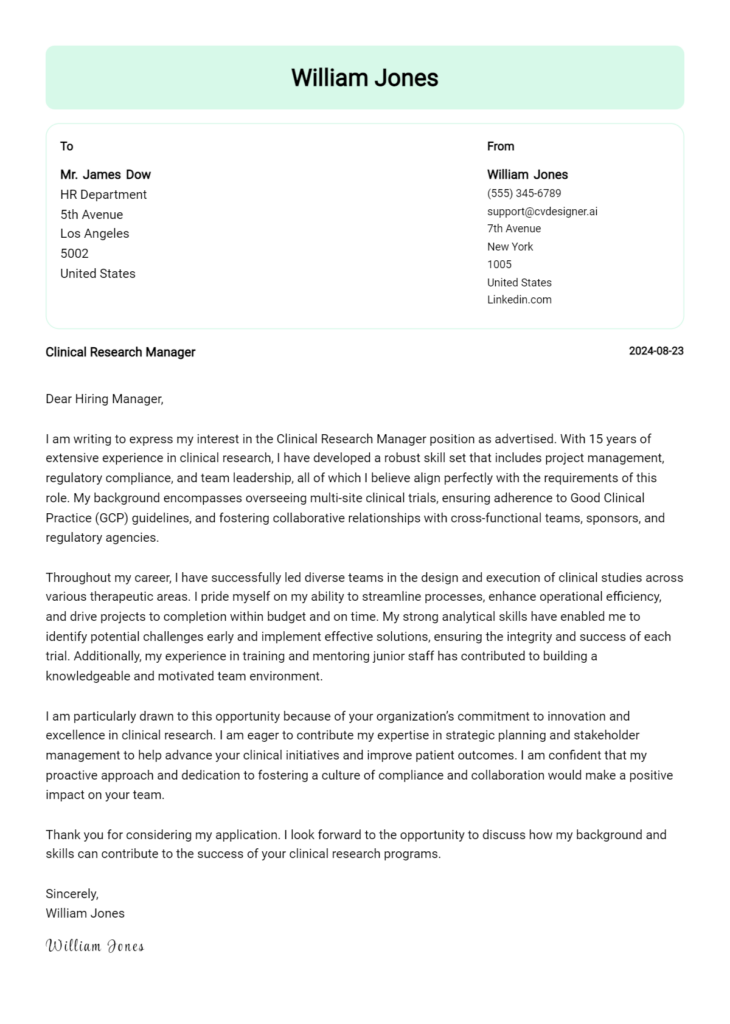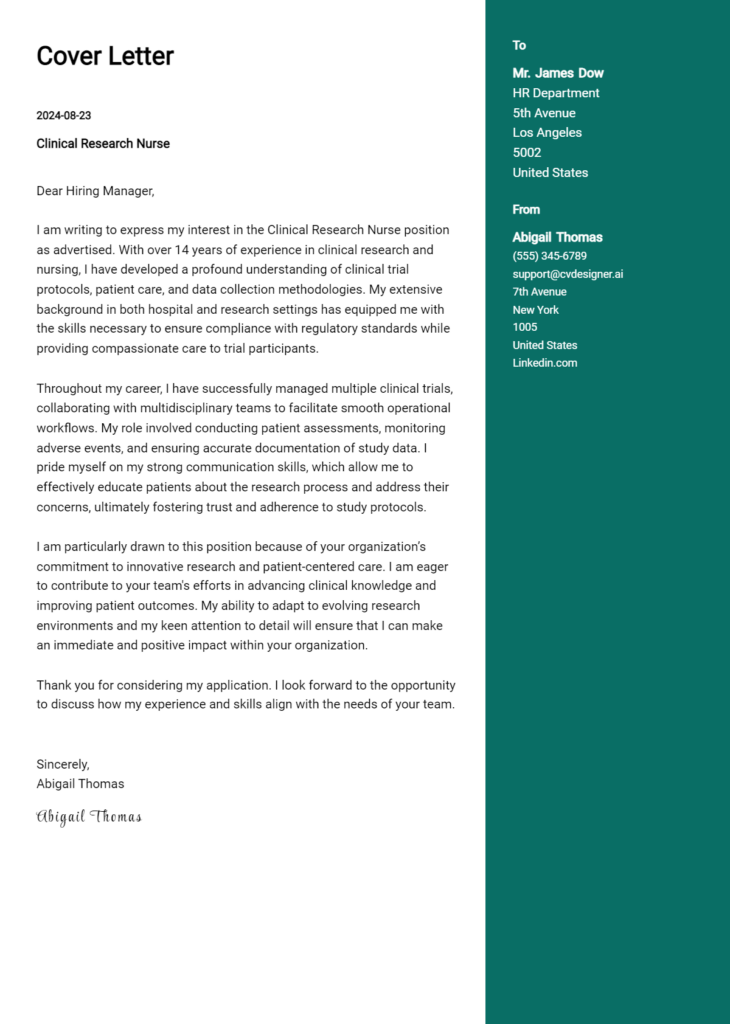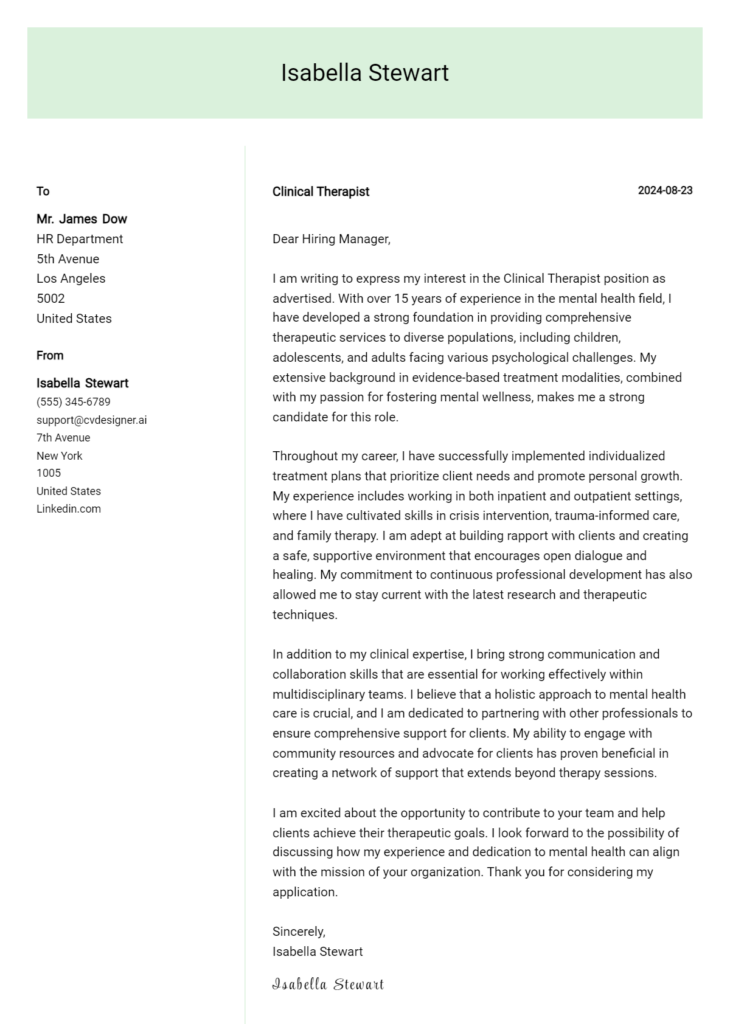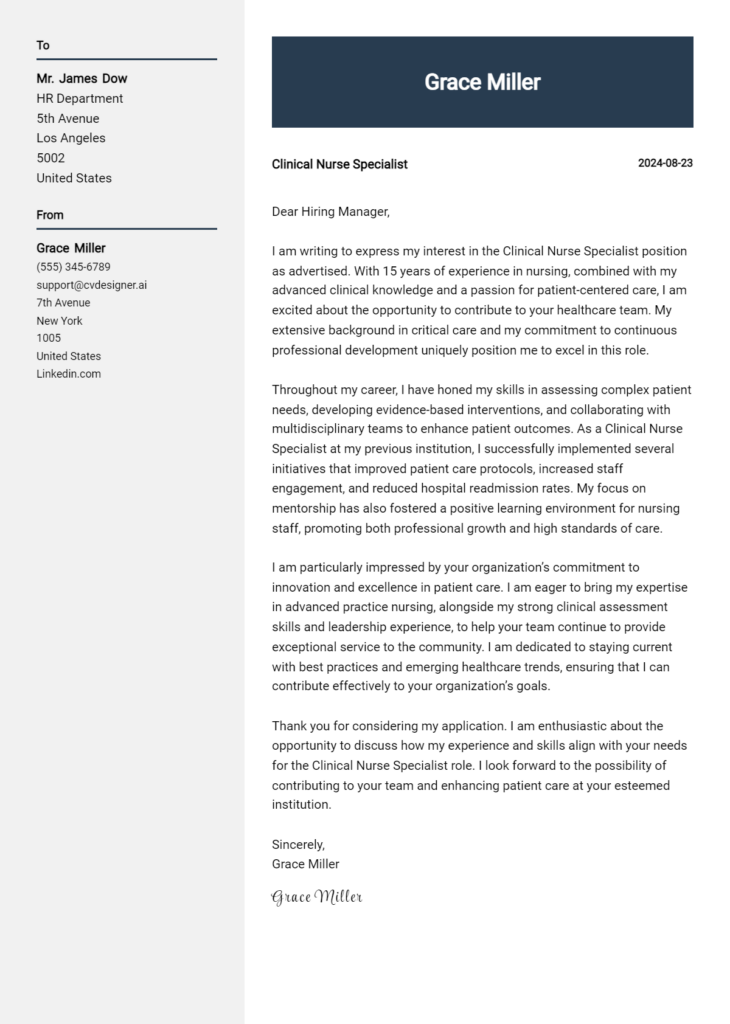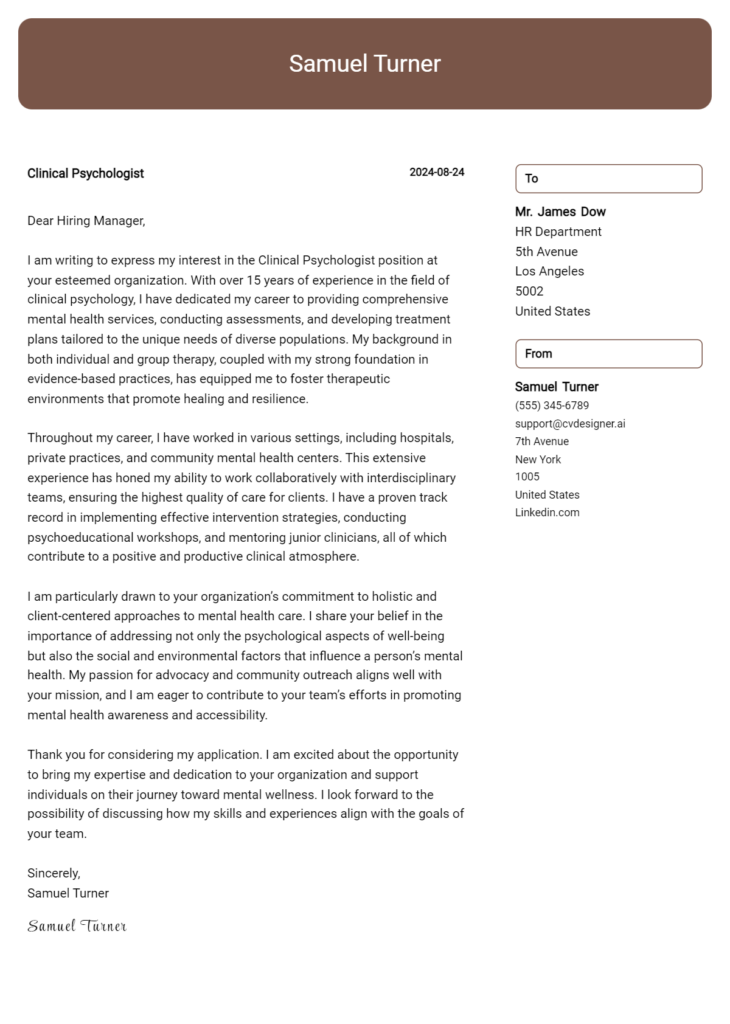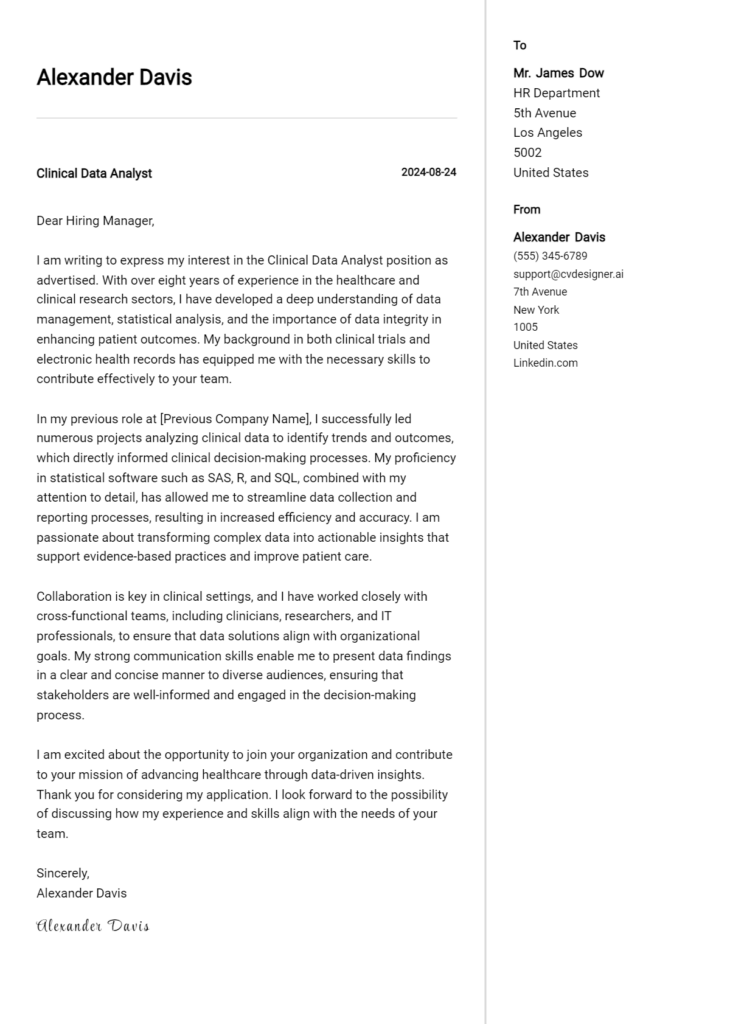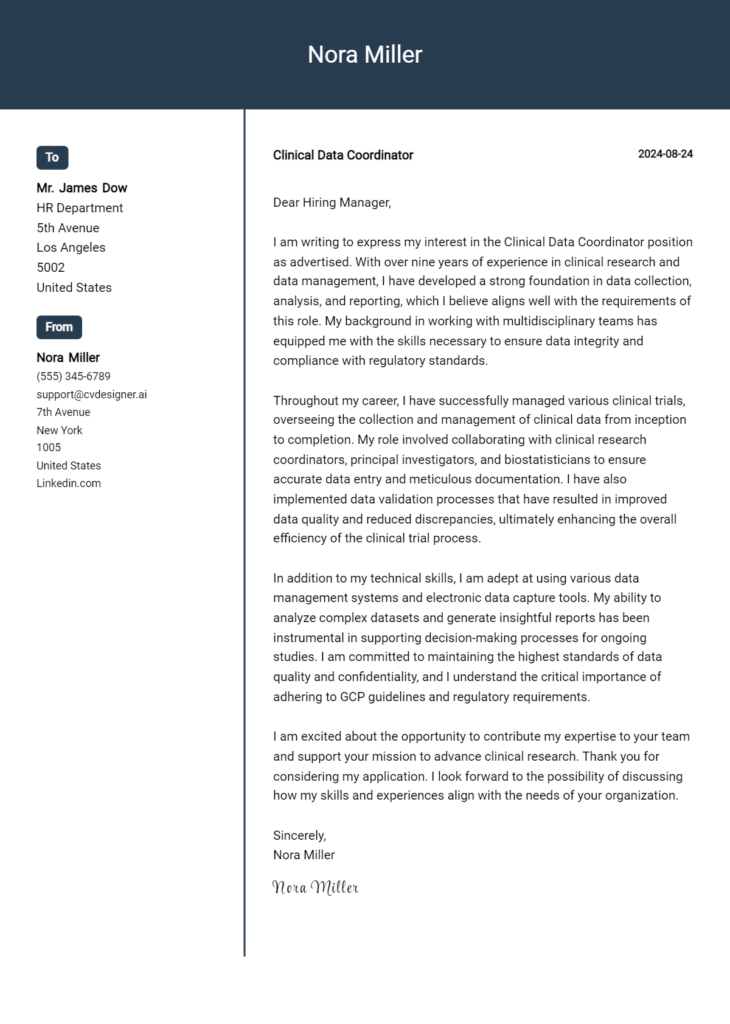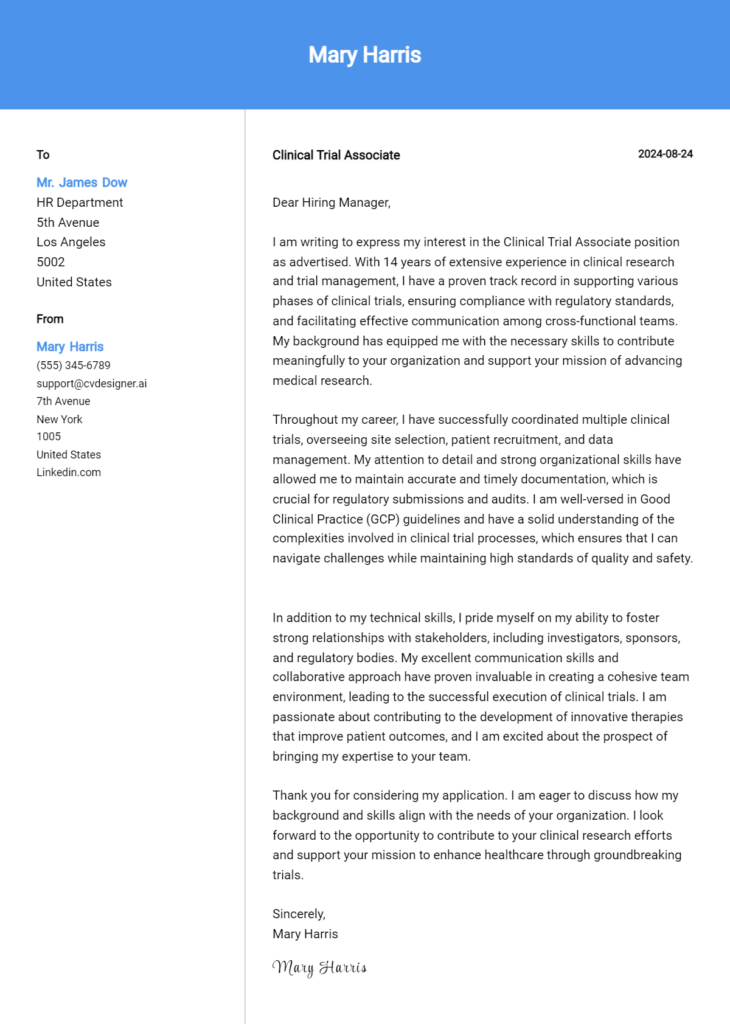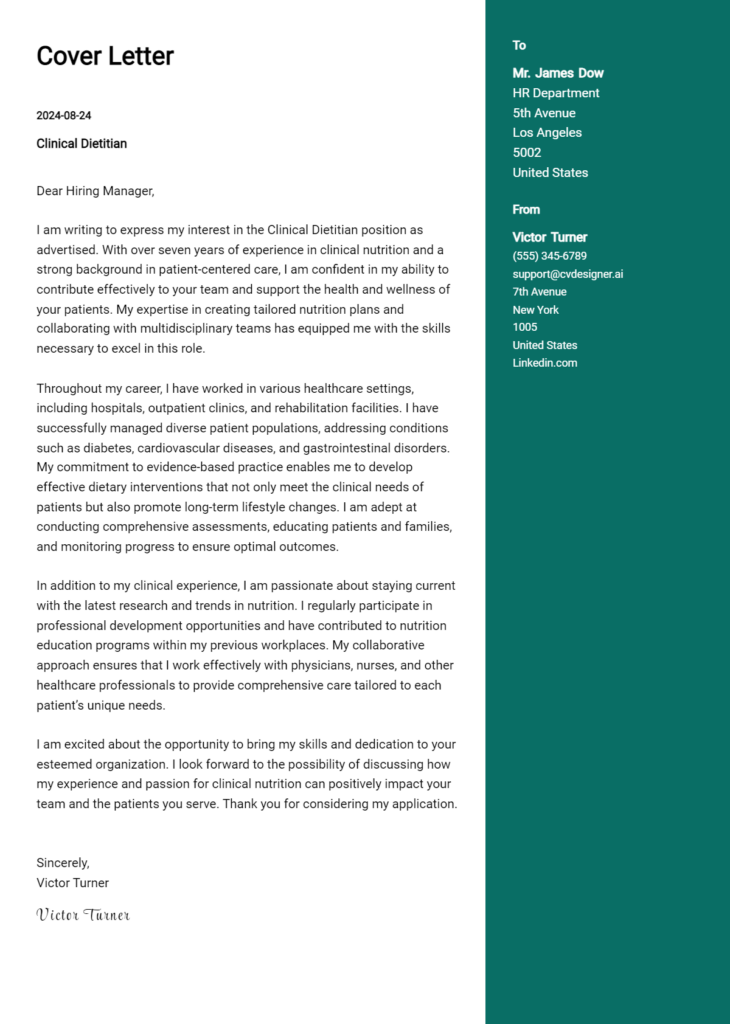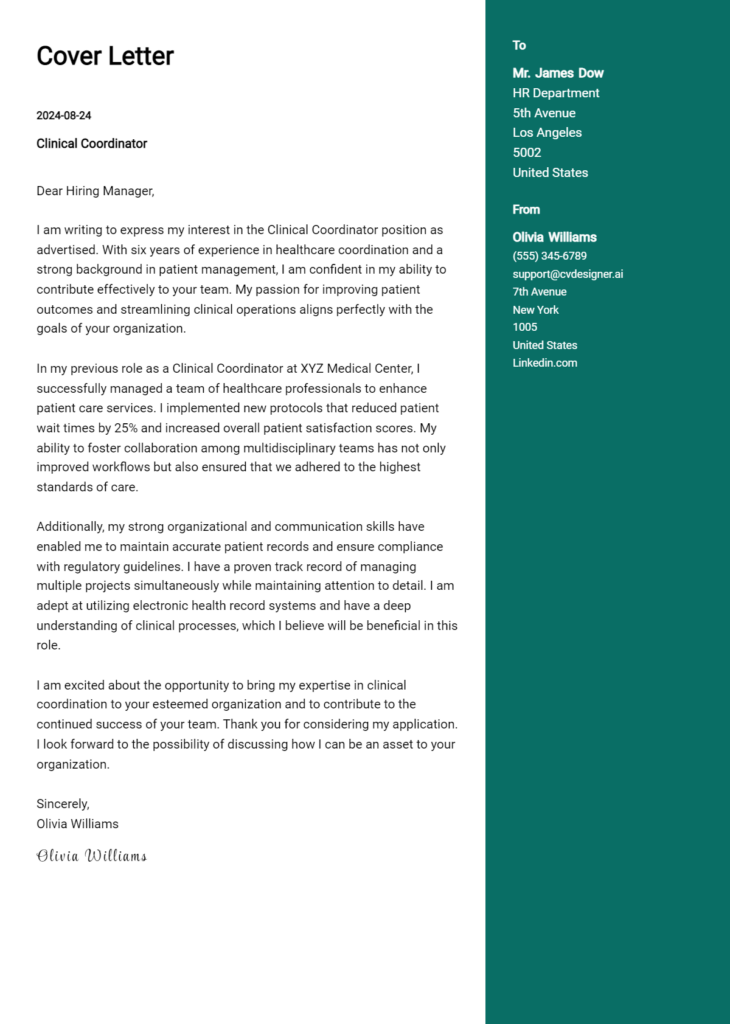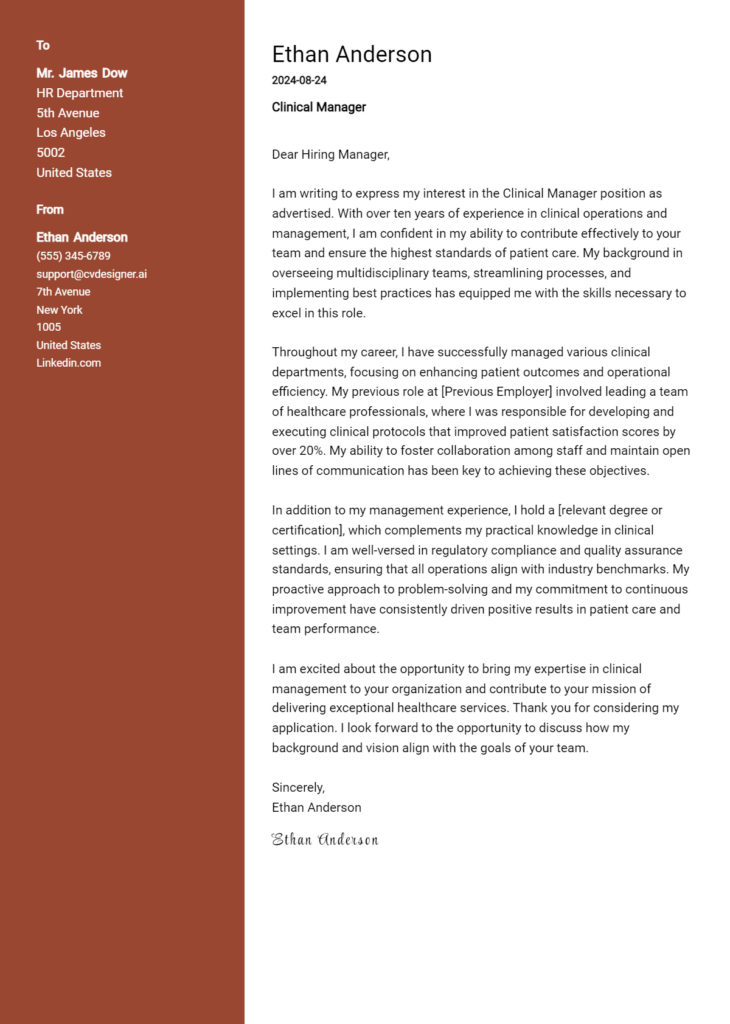Most Popular Clinical Specialist Cover Letter Examples
Explore additional Clinical Specialist cover letter samples and guides and see what works for your level of experience or role.
Are you ready to take your career as a Clinical Specialist to the next level? Crafting a compelling cover letter is crucial in making a strong first impression and showcasing your unique qualifications. In this article, we will guide you through the essential elements of writing an effective Clinical Specialist cover letter that sets you apart from the competition. Here's what you can expect to learn:
- What does a Clinical Specialist Cover Letter accomplish? Understand the importance of a well-crafted cover letter in highlighting your skills and experiences.
- Key Components of a Clinical Specialist Cover Letter: Discover the core elements that every successful cover letter should include.
- Format a Clinical Specialist Cover Letter: Get tips on how to properly format your cover letter for maximum impact.
- Three different level cover letter examples: Explore examples tailored for entry-level, mid-level, and senior Clinical Specialist positions.
- Common Mistakes to Avoid in a Clinical Specialist Cover Letter: Learn about the pitfalls that can detract from your application and how to avoid them.
- Key Takeaways: Summarize the essential points to remember as you create your own cover letter.
Dive in and equip yourself with the knowledge and tools you need to make your application stand out in this competitive field!
What does a Clinical Specialist Cover Letter accomplish?
A cover letter for a Clinical Specialist plays a crucial role in highlighting an applicant's qualifications, experience, and passion for the field, setting them apart from other candidates. It allows the candidate to convey their understanding of clinical practices and patient care while demonstrating their ability to communicate effectively with both medical professionals and patients. By personalizing the letter to the specific job and organization, applicants can showcase their unique skills and how they align with the company's goals. Additionally, a well-crafted cover letter complements a resume, providing a more comprehensive view of the applicant's capabilities. For those looking for guidance, a cover letter guide can be invaluable, and using a cover letter builder can streamline the process, ensuring a professional presentation.
Key Components of a Clinical Specialist Cover Letter
- Introduction and Personalization: Start your cover letter with a strong opening that introduces yourself and specifies the position you are applying for. Personalize the letter by mentioning the company’s name and expressing your enthusiasm for the role. This sets a positive tone and shows your genuine interest in the position.
- Relevant Experience and Qualifications: Highlight your clinical experience and relevant qualifications that make you a suitable candidate for the Clinical Specialist role. Include specific examples of your achievements and how they relate to the job description. This demonstrates your capability and readiness for the position.
- Skills and Contributions: Emphasize the specific skills and expertise you bring to the role, such as patient assessment, treatment planning, or collaboration with healthcare teams. Discuss how these skills can contribute to the organization’s goals and improve patient outcomes. This showcases your value as a potential employee.
- Closing Statement and Call to Action: Conclude your cover letter with a strong closing statement that reiterates your interest in the role and expresses your willingness to discuss your application further. A call to action, such as suggesting a meeting or interview, encourages the hiring manager to take the next step.
For more guidance, you can check out cover letter examples and learn about cover letter format to help create a compelling application.
How to Format a Clinical Specialist Cover Letter
As a dedicated and knowledgeable Clinical Specialist, I understand the importance of effectively communicating my skills and experiences to potential employers. A well-structured cover letter can set the tone for a successful job application. Below are key points to consider when formatting your cover letter for a Clinical Specialist position:
- Tailor Your Opening: Begin with a personalized greeting and mention the specific position you’re applying for, along with the company name.
- Engaging Introduction: Start with an attention-grabbing statement that highlights your passion for the field and relevant experience in clinical settings.
- Highlight Relevant Experience: Clearly outline your clinical experience, including specific roles, responsibilities, and the settings in which you have worked.
- Showcase Your Skills: Emphasize key skills relevant to the role, such as patient assessment, treatment planning, and collaboration with healthcare teams.
- Quantify Achievements: Use metrics or specific examples to demonstrate your impact, such as improving patient outcomes or streamlining processes.
- Discuss Continuous Learning: Mention any ongoing education, certifications, or training that enhance your qualifications as a Clinical Specialist.
- Express Your Passion for Patient Care: Share a brief anecdote or example that illustrates your commitment to providing high-quality patient care.
- Mention Team Collaboration: Highlight your ability to work effectively in a multidisciplinary team, showcasing your interpersonal and communication skills.
- Convey Understanding of the Organization: Demonstrate knowledge of the company’s mission and values, and explain how your goals align with theirs.
- Strong Closing Statement: End with a confident closing that expresses your enthusiasm for the position and a willingness to discuss your application further in an interview.
Clinical Specialist Entry-Level Cover Letter Example #1
I am writing to express my interest in the Clinical Specialist position at [Company Name], as advertised on [Job Board/Company Website]. With a recent degree in [Your Degree] from [Your University] and a strong foundation in clinical practices and patient care, I am eager to contribute my skills and passion for healthcare to your team.
During my academic career, I completed an internship at [Internship Location], where I gained hands-on experience in [specific tasks or responsibilities related to clinical work]. This role allowed me to collaborate with healthcare professionals in a fast-paced environment, enhancing my ability to communicate effectively with both colleagues and patients. I developed a keen understanding of clinical protocols and the importance of patient-centered care, which I believe aligns perfectly with the mission of [Company Name].
Additionally, I participated in various volunteer opportunities, including [Volunteer Experience], where I assisted in [specific tasks]. This experience not only honed my clinical skills but also deepened my commitment to improving patient outcomes. I am passionate about utilizing evidence-based practices and staying updated on the latest advancements in the field, which I believe would help me thrive in the Clinical Specialist role.
I am excited about the opportunity to bring my unique background and dedication to [Company Name]. I am particularly drawn to your commitment to [specific value or initiative of the company], and I am eager to contribute to your team as a Clinical Specialist. Thank you for considering my application. I look forward to the possibility of discussing how my education and experiences align with the needs of your organization.
Clinical Specialist Mid-Level Cover Letter Example #2
I am writing to express my interest in the Clinical Specialist position at [Company Name], as advertised on [where you found the job listing]. With over [X years] of hands-on experience in the clinical field, combined with my dedicated commitment to improving patient outcomes, I am excited about the opportunity to contribute to your team.
In my previous role as a Clinical Specialist at [Previous Company Name], I successfully collaborated with multidisciplinary teams to implement evidence-based practices that enhanced patient care and operational efficiency. My responsibilities included training healthcare providers on the latest clinical protocols and product usage, which resulted in a [specific percentage]% increase in compliance with best practices across the department. I am particularly proud of leading a project that reduced patient readmission rates by [specific percentage]% through targeted patient education and follow-up care initiatives.
Moreover, I possess a strong foundation in clinical research and data analysis, having conducted several studies aimed at optimizing treatment strategies for [specific patient population or condition]. My ability to interpret complex clinical data allowed me to present actionable insights to stakeholders, driving informed decision-making processes. I am adept at utilizing various clinical software systems, which I believe would enhance my contributions at [Company Name].
My passion for patient advocacy and education aligns with [Company Name]’s mission to deliver high-quality healthcare solutions. I am eager to bring my background in clinical support and my commitment to continuous learning to your organization. I am confident that my skills in building relationships with clinical staff and my proactive approach to problem-solving will make a positive impact on your team.
Thank you for considering my application. I look forward to the opportunity to discuss how my experience and vision align with the goals of [Company Name]. I am excited about the possibility of contributing to your esteemed organization and am available for an interview at your earliest convenience.
Clinical Specialist Experienced Cover Letter Example #3
Dear [Hiring Manager's Name],
I am writing to express my interest in the Clinical Specialist position at [Company Name], as advertised on [where you found the job listing]. With over [X years] of extensive experience in clinical settings, specializing in [specific area of expertise, e.g., cardiovascular care, oncology, etc.], I am excited about the opportunity to contribute to your team and support the delivery of exceptional patient care.
Throughout my career, I have successfully collaborated with multidisciplinary teams to enhance patient outcomes through the implementation of evidence-based practices. At [Previous Company Name], I played a pivotal role in developing and facilitating training programs for healthcare professionals, which resulted in a [specific percentage] improvement in patient compliance and satisfaction scores. My ability to communicate complex clinical information in an accessible manner has been vital in fostering teamwork and enhancing the overall quality of care.
In addition to my clinical expertise, I have a proven track record of utilizing data analytics to drive clinical decision-making and optimize operational efficiency. During my tenure at [Another Previous Company Name], I led a quality improvement initiative that analyzed patient data trends and identified areas for intervention. This project not only reduced readmission rates by [specific percentage] but also garnered recognition from senior leadership for its significant impact on patient safety.
I am particularly drawn to the Clinical Specialist role at [Company Name] because of your commitment to innovation and excellence in patient care. I am eager to bring my background in [specific skills or technologies relevant to the job] to your organization, where I believe I can make a meaningful contribution. Moreover, my passion for mentoring and supporting junior staff aligns with your mission to cultivate a collaborative and knowledgeable healthcare environment.
Thank you for considering my application. I am looking forward to the opportunity to discuss how my experience and vision align with the goals of [Company Name]. I am eager to bring my skills in clinical excellence and patient advocacy to your esteemed team.
Sincerely,
[Your Name]
[Your Phone Number]
[Your Email Address]
Cover Letter Tips for Clinical Specialist
When crafting a cover letter for a Clinical Specialist position, it's essential to convey both your clinical expertise and your ability to communicate effectively with patients and healthcare professionals. Start by researching the specific organization and role you're applying for to tailor your letter accordingly. Highlight your relevant experience and skills, such as your proficiency with medical technology, familiarity with regulatory standards, and ability to train staff or educate patients. Remember, your cover letter should complement your resume, providing context and narrative around your qualifications while expressing your genuine enthusiasm for the role and the organization.
Tips for Writing a Cover Letter for a Clinical Specialist:
- Customize Your Letter: Address the hiring manager by name and tailor your cover letter to reflect the specific requirements and values of the organization.
- Highlight Relevant Experience: Focus on your clinical experience, including any specialties or technologies you are proficient in, and how they relate to the job description.
- Showcase Communication Skills: Emphasize your ability to explain complex medical concepts to patients and collaborate effectively with healthcare teams.
- Include Metrics and Achievements: Whenever possible, quantify your accomplishments (e.g., reduced patient wait times by 20%, trained 50+ staff members) to demonstrate your impact.
- Express Passion for Patient Care: Share a brief anecdote or example that illustrates your commitment to improving patient outcomes and health education.
- Keep It Professional but Personable: Maintain a professional tone while allowing your personality to shine through; this balance can make you more relatable to the reader.
- Proofread for Errors: Ensure your cover letter is free of grammatical errors and typos, as attention to detail is crucial in clinical roles.
- End with a Call to Action: Conclude your letter by expressing your desire for an interview and indicating your willingness to discuss how you can contribute to the team.
How to Start a Clinical Specialist Cover Letter
Starting a cover letter is crucial as it sets the tone for the rest of your application. Here are some effective examples of introductory paragraphs for a Clinical Specialist cover letter:
- As a highly dedicated Clinical Specialist with over five years of experience in patient care and clinical training, I am excited to apply for the position at [Company Name]. My extensive background in developing tailored treatment plans and my commitment to enhancing patient outcomes align perfectly with your organization's mission.
- With a robust foundation in clinical practices and a passion for patient advocacy, I am eager to bring my expertise to the Clinical Specialist role at [Company Name]. My experience in collaborating with multidisciplinary teams to implement innovative healthcare solutions has prepared me to contribute effectively to your esteemed institution.
- I am writing to express my interest in the Clinical Specialist position at [Company Name]. With a strong clinical background and a track record of improving patient care standards, I am confident in my ability to support your team in delivering high-quality healthcare services.
- As a Clinical Specialist with a proven record in managing complex patient cases and implementing evidence-based practices, I am thrilled at the opportunity to join [Company Name]. My commitment to continuous learning and professional development has equipped me with the skills necessary to thrive in this dynamic role.
- Having worked in diverse clinical settings, I am excited to apply for the Clinical Specialist position at [Company Name]. My ability to analyze patient needs and provide comprehensive education and support has been instrumental in driving positive health outcomes, making me a strong candidate for your team.
How to Close a Clinical Specialist Cover Letter
To effectively close a cover letter for a Clinical Specialist position, it's important to reiterate your enthusiasm for the role and your readiness to contribute to the team. Here are some examples of how to craft a compelling closing statement:
“I am excited about the opportunity to bring my clinical expertise and passion for patient care to your team. I look forward to the possibility of discussing how I can contribute to the success of your organization.”
“Thank you for considering my application. I am eager to leverage my skills in clinical assessment and patient education to enhance the quality of care at your facility.”
“I appreciate your time and consideration. I am enthusiastic about the prospect of working together to advance patient outcomes and would welcome the chance to discuss my qualifications in further detail.”
“I am keen to join your team and contribute to innovative clinical practices. I look forward to the opportunity to speak with you about how my experience aligns with the needs of your department.”
Common Mistakes to Avoid in a Clinical Specialist Cover Letter
When applying for a Clinical Specialist position, your cover letter serves as a critical first impression that can set you apart from other candidates. To make sure your cover letter effectively showcases your qualifications and enthusiasm for the role, it's important to avoid common pitfalls that could undermine your application. Here are some frequent mistakes to watch out for:
- Generic Addressing: Failing to address the letter to a specific person can make your application seem impersonal. Always try to find the hiring manager's name.
- Rehashing Your Resume: Simply repeating the information from your resume without adding context or personal insights can make your cover letter redundant.
- Lack of Specificity: Avoid vague statements about your skills and experiences. Instead, provide concrete examples that demonstrate your qualifications for the Clinical Specialist role.
- Ignoring the Job Description: Not tailoring your cover letter to the specific job description can make it appear that you are not genuinely interested in the position.
- Using Jargon Excessively: While familiarity with medical terminology is essential, overloading your cover letter with jargon can confuse the reader and detract from your message.
- Neglecting to Highlight Key Achievements: Failing to include quantifiable achievements or successful case studies can make it difficult for hiring managers to assess your impact in previous roles.
- Poor Formatting: A cover letter that is cluttered or poorly formatted can be off-putting. Ensure your letter is organized, professional, and easy to read.
- Spelling and Grammar Errors: Typos and grammatical mistakes can create a negative impression and suggest a lack of attention to detail, which is crucial in clinical settings.
- Overly Formal or Informal Tone: Striking the right balance in tone is essential. Being too formal can seem stiff, while an overly casual tone can come off as unprofessional.
- Failure to Express Enthusiasm: Not conveying genuine interest or passion for the role and the organization can make your application less compelling.
Key Takeaways for a Clinical Specialist Cover Letter
In conclusion, crafting an effective cover letter for a Clinical Specialist position requires a clear demonstration of your clinical expertise, relevant experience, and a strong alignment with the values of the organization. Highlighting specific skills and accomplishments that relate directly to the role will set you apart from other candidates. Remember to maintain a professional tone while expressing your passion for patient care and commitment to clinical excellence. For those looking for additional guidance, utilizing tailored cover letter templates can streamline the writing process and ensure a polished final product.
Additionally, if you're seeking a more structured approach to building your cover letter, consider using a cover letter builder. These tools can help you organize your thoughts and present your qualifications in a compelling manner. By investing time in your cover letter, you increase your chances of making a strong impression and landing an interview for that coveted Clinical Specialist role.
